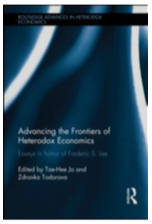
NEP’s Bill Black talks economics and the Irish economy with Neil Delamere on Neil’s Sunday Best program. You can listen here.

NEP’s Bill Black talks economics and the Irish economy with Neil Delamere on Neil’s Sunday Best program. You can listen here.
Comments Off on Neil Delamere Talks Economics with Bill Black
Posted in William K. Black
Tagged ireland, Kilkenomics
Our friends over at RETE in Italy have done it again! They have translated and posted Scott Fullwiler’s works on central banking operations into Italian. For our Italian speaking friends, you can now check out Scott’s translated posts here.
Comments Off on Scott Fullwiler’s Central Banking Operations Now in Italian
Posted in Scott Fullwiler
Tagged banking operations, Italian, MMT, Modern Monetary Theory, RETE
NEP’s Bill Black and Wharton professor of legal studies and business ethics Peter Conti-Brown discuss the Bank of England’s move to re-regulate the banking industry in Britain and protect depositors and taxpayers. You can view the article and listen to the podcast here.
 Advancing the Frontiers of Heterodox Economics: Essays in Honor of Frederic S. Lee
Advancing the Frontiers of Heterodox Economics: Essays in Honor of Frederic S. LeeEdited by Tae-Hee Jo and Zdravka Todorova
Series in the Routledge Advances in Heterodox Economics ISBN: 978-0-415-73031-0 (hardback), 358 pages, $160. August 2015, Routledge. (20% Discount code: FLR40)
For more information visit:
http://www .taylorandfrancis.com/books/details/9780415730310
Posted in Uncategorized
Video and article over at Kansas City’s KSHB highlighting NEP’s Randy Wray’s analysis of the problems with the European Monetary Union and his predictions that it would lead to the European crisis. You can view the video and read the article here.
Comments Off on UMKC professor among handful of economist to predict Eurozone fiscal downturn
Posted in L. Randall Wray
NEP’s Bill Black appears with Richard “RJ” Eskow on the Zero Hour discussing the DOJ’s change in stance regarding prosecuting elite white collar criminals. You can view the video below.
Comments Off on If the Justice Dept Wants to Punish Corporate Crooks, Here’s How
Posted in William K. Black
By Felipe Rezende
Introduction
The creation of new sources of financing and funding are at the center of discussions to promote real capital development in Brazil. It has been suggested that access to capital markets and long-term investors are a possible solution to the dilemma faced by Brazil’s increasing financing requirements (such as infrastructure investment and mortgage lending needs) and the limited access to long-term funding in the country. Policy initiatives were implemented aimed at the development of long-term financing to lengthen the maturity of fixed income instruments (Rezende 2015a). Though average maturity has lengthened over the past 10 years and credit has soared, banks’ credit portfolios still concentrate on short maturities (with the exception of the state-owned banks including Caixa Economica Federal [CEF] and the Brazilian Development Bank [BNDES]).
Comments Off on Endogenous financial fragility in Brazil: Does Brazil’s National Development Bank reduce external fragility?
Posted in Felipe C. Rezende
Tagged Brazil
By Felipe Rezende
In previous posts (see here and here), I discussed Standard & Poor’s (S&P) downgrade of Brazil’s long-term foreign currency sovereign credit rating to junk status, that is, to ‘BB+’ from ‘BBB-‘ and its decision to downgrade Brazil’s local currency debt to a single notch above “junk” status.
Felipe Rezende
So S&P has downgraded Brazil’s rating on long-term foreign currency debt to junk and lowered its long-term local currency sovereign credit rating to ‘BBB-‘ from ‘BBB+’.
First, what are sovereign debt ratings? Standard & Poor’s sovereign rating is defined as follows:
A current opinion of the creditworthiness of a sovereign government, where creditworthiness encompasses likelihood of default and credit stability (and in some cases recovery).
So that ratings are related to “a sovereign’s ability and willingness to service financial obligations to nonofficial (commercial) creditors.”
What does this tell us? To begin with, credit rating agencies have repeatedly been wrong. The same agencies that rated Enron investment grade just weeks before it went bust, the same people that assigned triple A rating to toxic subprime mortgage-backed securities are now downgrading Brazil sovereign debt. As the FCIC report pointed out “The three credit rating agencies were key enablers of the financial meltdown. The mortgage-related securities at the heart of the crisis could not have been marketed and sold without their seal of approval.” (FCIC 2011)
To update our Spanish friends:
In an effort to bring MMT into the political debate in Spain, APEEP will be hosting Warren Mosler for his presentation of the Spanish translation of his book “The Seven Deadly Innocent Frauds of Economic Policy” during a one-week tour through Spain, starting with a presentation in Madrid, on the 14th of September; Valencia on the 15th of September; and Vila-real on the 17th of September.
Comments Off on MMT In Spain
Posted in MMT, Modern Monetary Theory, warren mosler
Tagged MMT, spain, warren mosler